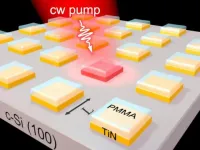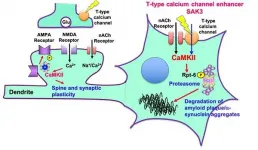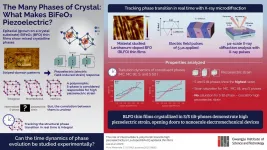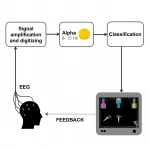(Press-News.org) Tsukuba, Japan - Depression is a worldwide problem, with serious consequences for individual health and the economy, and rapid and effective screening tools are thus urgently needed to counteract its increasing prevalence. Now, researchers from Japan have found that artificial intelligence (AI) can be used to detect signs of depression.
In a study published this month in BMJ Open, researchers from University of Tsukuba have revealed that an AI system using machine learning could predict psychological distress among workers, which is a risk factor for depression.
Although many questionnaires exist that screen for mental health conditions, individuals may be hesitant to answer truthfully questions about subjective mood due to social stigma regarding mental health. However, a machine learning system could be used to screen depression/psychological distress without such data, something the researchers at University of Tsukuba aimed to address.
"We wanted to see if the AI system could detect psychological distress in a large population from sociodemographic, lifestyle, and sleep factors, without data about subjective states, such as mood," says lead author of the study Professor Shotaro Doki.
To investigate this, the researchers asked a group of researchers and office workers to complete an online survey about sociodemographic, lifestyle, and sleep factors. Then, they developed an AI model that predicted psychological distress according to data from 7251 participants, and compared the results obtained from the AI model with predictions made by a team of 6 psychiatrists.
"The results were surprising," explains Professor Doki. "We found that even without data about mood, the AI model and the team of psychiatrists produced similar predictions regarding moderate psychological distress."
Furthermore, for participants with severe psychological distress, the predictions made by the AI model were more accurate than the predictions of the psychiatrists.
"This newly developed model appears to easily be able to predict psychological distress among large numbers of workers, without data regarding their subjective mood," says Professor Doki. "This effectively avoids the issue of social stigma concerning mental health in the workplace, and eliminates the risk of inappropriate responses to questions asking about respondents' mood."
Thus, screening tools that do not require individuals to report their subjective mood may be more accurate, and thus better able to identify individuals who would not otherwise receive treatment. Earlier interventions to treat depression and psychological distress are likely to lessen the severity of mental illness, with important benefits for both individuals and society.
INFORMATION:
The article, "Comparison of predicted psychological distress among workers between artificial intelligence and psychiatrists: a cross-sectional study in Tsukuba Science City, Japan" was published in BMJ Open at DOI: 10.1136/bmjopen-2020-046265
This work was supported financially by JSPS KAKENHI (Grant No. 19K19431). The authors wish to declare the following competing interests: SS is the Chair of the Occupational Health Technical Committee, Tsukuba Science City Network; SD, YO and DH are members of the Occupational Health Technical Committee and the other authors are members of the Occupational Health Technical Committee Working Group. None of the authors received remuneration.
Atomic nuclei contain enormous energy that can be extracted through their fission mechanism, for example, as a result of the radioactive decay of uranium or plutonium nuclei. Likewise, a quantum of light of several electron-volts (2.4 eV in a laser pointer with a green beam) has colossal energy. If all photons were absorbed by matter, then its temperature could reach several thousand degrees. However, in practice this does not happen. The reason is the weak light-matter interaction due to the fact that the wavelength of light (500 nm) is a thousand times larger than the size of an emitting / absorbing atom (0.5 nm). It is this physical mechanism that prevents the destruction of matter when illuminated. The efficiency of light absorption increases ...
Researchers have identified a new treatment candidate that appears to not only halt neurodegenerative symptoms in mouse models of dementia and Alzheimer's disease, but also reverse the effects of the disorders.
The team, based at Tohoku University, published their results on June 8 in the International Journal of Molecular Sciences. The treatment candidate has been declared safe by Japan's governing board, and the researchers plan to begin clinical trials in humans in the next year.
"There are currently no disease-modifying therapeutics for neurodegenerative disorders such as Alzheimer's disease, Lewy body dementia, Huntington ...
As our society and transportation systems become increasingly electrified, scientists worldwide are seeking more efficient and higher capacity storage systems. Researchers at KAUST have made an important contribution by modifying lithium-sulfur (Li-S) batteries to suppress a problem known as polysulfide shuttling.
"The bottleneck in the utilization of renewable energy, especially in transportation, is the need for high-density batteries," says Eman Alhajji, Ph.D. student and first author of the research paper.
Li-S batteries have several potential advantages over ...
Bobtail and bottletail squids are tiny marine invertebrates that are found throughout the world's oceans and are useful model animals for research
There are 68 recognized species of bobtail squid and five recognized species of bottletail squid, but the timing of their divergence from one another is still relatively unknown
Researchers at OIST, Hiroshima University and the National University of Ireland Galway, collected 32 species of bobtail and bottletail squids
They looked at the genetic variations across the entire genomes of these species to estimate their evolutionary relationships
The results showed that the divergence of these species aligned with major ...
Tel Aviv University's groundbreaking technology may revolutionize the treatment of cancer and a wide range of diseases and medical conditions. In the framework of this study, the researchers were able to create a new method of transporting RNA-based drugs to a subpopulation of immune cells involved in the inflammation process, and target the disease-inflamed cell without causing damage to other cells.
The study was led by Prof. Dan Peer, a global pioneer in the development of RNA-based therapeutic delivery. He is Tel Aviv University's Vice President for Research and Development, head of the Center for Translational Medicine and a member of both the Shmunis School of Biomedicine and Cancer Research, George S. Wise Faculty ...
What if electricity could be squeezed out of something? It turns out some materials have this property. Piezoelectricity is the electric charge that accumulates in certain solids when mechanical stress is applied on them. Piezoelectric materials, like bismuth ferrite thin films, when grown on a single lanthanum aluminate substrate give rise to highly strained epitaxial thin films that exhibit excellent electromechanical and ferroelectric properties. In bismuth ferrite thin films "doped" or polluted with lanthanum (BLFOs), piezoelectricity is attributed to the presence of "mixed-phase structures" with stripe patterns.
The formation of stripe patterns and controlling the mixed-phase structures of BLFO have been the ...
A FLEET theoretical study out this week has found a 'smoking gun' in the long search for the topological magnetic monopole referred to as the END ...
HARWELL, UK (29 June 2021) Researchers working on the Faraday Institution project on the recycling of lithium-ion batteries (ReLiB) at the Universities of Leicester and Birmingham have solved a critical challenge in the recovery of materials used in electric vehicle batteries at the end of their life, enabling their re-use in the manufacture of new batteries. The new method, which uses ultrasonic waves to separate out valuable material from the electrodes, is 100 times quicker, greener and leads to a higher purity of recovered materials relative to current separation methods.
The research has been published in Green Chemistry and the team have applied for a patent for the technique.
To ...
Patients with mild Covid-19 infections experience a significantly increased longer lasting reduced sense of taste and smell. This is also the case for long-term shortness of breath, although relatively few people are affected. And women and the elderly are particularly affected. This is shown by new research findings from Aarhus University Aarhus University Hospital and Regional Hospital West Jutland
The last 14 months have taught us that there are different symptoms and outcomes of Covid-19. However, the vast majority of people who fall ill with Covid-19 experience mild symptoms and get over ...
Attention Deficit Hyperactivity Disorder (ADHD) affects about 7% of children, with a two out of three chance of persisting into adulthood. This neurodevelopmental disorder is characterised by concentration difficulties, increased distractibility, impulsivity and hyperactivity. Today, ADHD is treated with pharmaceutical drugs that may have unwanted side effects. This is why scientists from the University of Geneva (UNIGE) and the University Hospitals of Geneva (HUG), Switzerland, explored a new technique called 'neurofeedback', which enables ADHD patients to train their attention, based on instant feedback from the level of their brain activity. The team of neuroscientists found that not only did the training have a positive effect on patients' concentration abilities, but also that the ...





